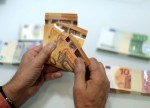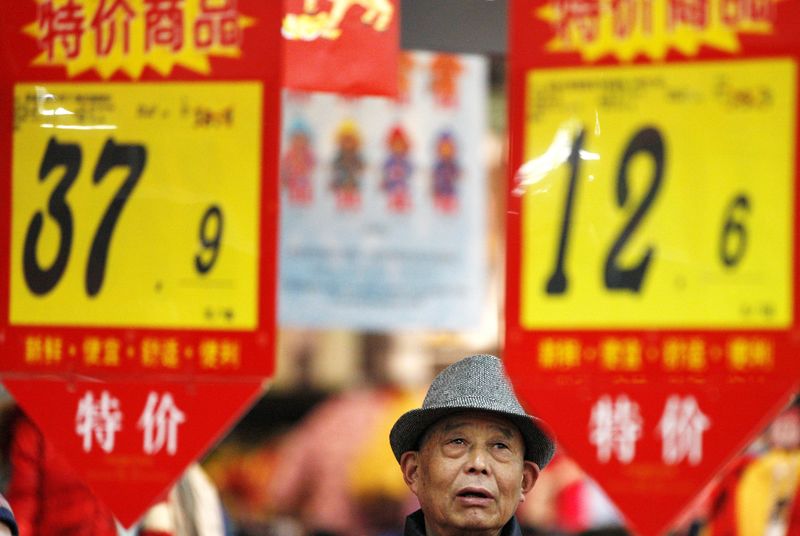
- All Instrument Types
- Indices
- Equities
- ETFs
- Funds
- Commodities
- Currencies
- Crypto
- Bonds
- Certificates
Please try another search

Exclusive - China likely to ease again if inflation falls: central bank adviser
 © Reuters. A customer looks at price tags at a supermarket in Huaibei
© Reuters. A customer looks at price tags at a supermarket in Huaibei
By Xiangming Hou and Koh Gui Qing
BEIJING (Reuters) - China is likely to cut interest rates or reserve requirements again if consumer inflation drifts below 1 percent, a member of the central bank's monetary policy committee said, as he ruled out more support for the sagging Chinese property market.
Qian Yingyi said policymakers still needed to monitor the inflation data for March and April to judge if deflation pressures were deepening in the world's second-biggest economy.
Having seen China lower interest rate twice since November, and also cut the level of cash banks must hold as reserves last month, most investors assume that China will further loosen monetary policy in coming months to buoy an economy that is on course for its worst year in a quarter of a century.
In an interview with Reuters on Wednesday, Qian, who is also an economics professor at China's elite Tsinghua University, said any policy move "is very much dependent on inflation".
"Many analysts believe that deflationary pressures will continue. If that happens, I won't be surprised if the central bank continues to reduce reserve requirements as well as interest rates," he said.
China's annual rate of consumer inflation quickened to 1.4 percent in February from a 5-year low of 0.8 percent the previous month, but Qian said the bounce could be a one-off blip as a result of the Lunar New Year holiday.
"It's not just the static level of inflation, it's the direction," said Qian, who is part of a 15-member monetary policy committee led by Governor Zhou Xiaochuan.
He said authorities were comfortable with inflation running between 1-2 percent in current circumstances, compared with the government's 2015 inflation target of 3 percent.
"If it's stable between 1 and 2 percent, it's very, very comfortable. But above 2 percent, there is a little bit of worry about inflation. Below 1 (percent), there will be bit of a worry about deflation," he said.
Unlike central banks in most major economies, the People's Bank of China has no policy autonomy and interest rate decisions are made by the cabinet. The monetary policy committee meets every quarter and makes recommendations to the government.
HOUSING MARKET NOT STIMULUS TOOL
China's economy has struggled over the last 15 months or so, weighed down by a property downturn, rising debt and lethargic foreign and domestic demand - which have all dented growth in exports, investment, manufacturing and retail sales.
The government last week said it was lowering its 2015 growth target for gross domestic product (GDP) to around 7 percent, from around 7.5 percent last year.
Qian, who holds a Ph.D from Harvard University and a masters degree from Yale, was sanguine about the economic outlook, arguing that advancing reforms was "much, much more important".
As a result, he said he did not expect Chinese policymakers to lower downpayment levels again for home buyers or discount mortgage rates any time soon.
"(China) needs the development of the real estate sector, but not use it as a stimulus tool to speed up GDP growth," said the bespectacled professor.
Chinese regulators - including the central bank - cut mortgage rates and downpayment levels in September to support a property sector that accounts for about 15 percent of the economy.
Fears that the move risked re-inflating an asset price bubble have so far proved unfounded - data on Wednesday showed property sales in China dropped by the most in three years in the first two months of 2015.
Qian, who described the central bank as the biggest supporter of China's financial and economic reforms, said he "won't be surprised" if an insurance scheme for bank depositors was launched before the end of June.
Experts believe insuring depositors is a crucial step to ensuring banks price loans according to risk.
There has been speculation in financial markets that China could also further relax currency controls by widening the yuan's
Qian said allowing the currency to trade more freely was on the cards this year if China does not experience volatile cross-border capital flows. China saw record capital outflows in the fourth quarter of 2014, as the economy stumbled.
"My expectation is if the...capital flows are mild or modest, I would expect more expansion in the band," said Qian. "If it's too volatile, I would expect the government to be cautious."
Related Articles
Are you sure you want to block %USER_NAME%?
By doing so, you and %USER_NAME% will not be able to see any of each other's Investing.com's posts.
%USER_NAME% was successfully added to your Block List
Since you’ve just unblocked this person, you must wait 48 hours before renewing the block.
I feel that this comment is:
Thank You!
Your report has been sent to our moderators for review






Add a Comment
We encourage you to use comments to engage with users, share your perspective and ask questions of authors and each other. However, in order to maintain the high level of discourse we’ve all come to value and expect, please keep the following criteria in mind:
Perpetrators of spam or abuse will be deleted from the site and prohibited from future registration at Investing.com’s discretion.